Kyle Nurminen - Bringing Roofing to the Inner City - PODCAST TRANSCRIPTION
September 11, 2023 at 4:57 p.m.Editor's note: The following is the transcript of a live interview with Kyle Nurminen from Total Roofing Systems. You can read the interview below or listen to the podcast.
Intro/Outro: Welcome to Roofing Road Trips with Heidi. Explore the roofing industry through the eyes of a long-term professional within the trade. Listen for insights, interviews, and exciting news in the roofing industry today.
Heidi J. Ellsworth: Hello, and welcome to another Roofing Road Trips from RoofersCoffeeShop. This is Heidi Ellsworth. And we're here today to talk about something different, something that's an initiative that we all need to think about. And our friend, Kyle Nurminen, came and talked to me about this. And I am so excited to bring his ideas to all of you. So, let's get started. Kyle, welcome to the show.
Kyle Nurminen: Good morning, Heidi. Thanks for having me again.
Heidi J. Ellsworth: Oh. I love it. Thank you. You're our club member. You're so active with RoofersCoffeeShop. But you've made my mind whirl with some of the ideas that you have, and I'm really excited for us to share those. So, first of all, let's start out with an introduction. Why don't you introduce yourself? Give us a little bit of your history in roofing. That would be great.
Kyle Nurminen: Okay. My name is Kyle Nurminen. I hail from Youngstown, Ohio, which is a very urban area, which is pertinent to what we'll be discussing today. And I'm a Navy veteran. And as I got out of the service, I was working my way working through the prison system, finishing my college degree, and graduated with the HR director of the fifth-largest roofing contractor in the nation at the time.
Heidi J. Ellsworth: Nice.
Kyle Nurminen: Yep. That contractor was a big part of the back-to-back hurricanes in the early 2000s. So, I was naturally corporately broken in into commercial roofing, seeing commercial roofing systems fail, and learning all about the environment in Florida. So, I was with them in Detroit up until 2006 when the market crashed. So I just came down here permanently, and I've been down here ever since.
Heidi J. Ellsworth: Tell us what you're doing today.
Kyle Nurminen: So, that's right. Yep. I ended up back here on the east coast of Florida where I initially came down to. After jumping around the state a little bit, I'm now on a metal roof focus, commercial metal roof retrofitting because I found Dynamic Metals has a patented retrofit system, which after 20 years here, was the best system I've ever seen in the market. So, I wanted to go represent it full-time. So, I'm with Total Roofing Systems, their sister company. And that's my clear line of focus, is commercial metal panel retrofitting.
Heidi J. Ellsworth: Man, I love it. I love it. You are so involved with the MetalCoffeeShop too. Thank you for everything. You give us such great content and ideas and thoughts. And we love having Total Roofing and Dynamic involved with us. But I really am excited for you to share your inspiration for inner cities and to help the roofing industry and all industries. So, please share your journey and start sharing that idea with us.
Kyle Nurminen: Well, it started in Tampa Bay when I was over there. And we were having a lot of the conversation we had at the expo recently about how do we fuel the generation of our businesses. So, there was a construction summit between technical schools and employers in the construction industry at the time. That led to me in a leadership, strategic doing, seminar and top out cascading to actually me discovering makerspaces around the Tampa Bay area, and actually mapping those resources as a resource for employers and technical schools to tap into the intellectual property in our most deprived neighborhoods. And you can promote events and bring kids out of these less fortunate areas. Because you can't tell me that a young adult or a child in an urban area has no less capability than the one in the better off suburbs, they just lack the opportunity.
Heidi J. Ellsworth: Exactly, yeah.
Kyle Nurminen: And that's what we're missing. We're missing it in our own neighborhood. So, how do we tap into that?After mapping that entrepreneurial space, business development, advanced engineering design for people that were making trinkets in these makerspaces, which we'll get into more about what those are, we're realizing these kids are working with their hands, and they're learning technical skills and they're learning business skills, and they're learning how to market and run a business model, and all this stuff. And it has nowhere to go because they have nowhere to have a collaborative manufacturing, to set up an assembly line. Have you ever watched Shark Tank, Heidi?
Heidi J. Ellsworth: Yes. Yes, I have.
Kyle Nurminen: Okay. So, somebody goes on Shark Tank. How many times have you heard them say, "Well, you got a good idea, but you're asking me to do everything?"
Heidi J. Ellsworth: Right. Right, yes.
Kyle Nurminen: The only people that are making something are the ones that outsource their labor overseas, and they can do a scalable model that way. Or you see these families turn their entire house and their garage into a soap factory.
Heidi J. Ellsworth: Yeah. Yeah.
Kyle Nurminen: Yeah. All these kids-
Heidi J. Ellsworth: It smells good, but it takes up lot your space.
Kyle Nurminen: Yeah, yeah. Well, these kids in these urban areas, they're going through engineering programs and learning all this stuff, or they're going to makerspaces and learning all this stuff, but they have nowhere to set that up. They don't have that home. They don't have that means to outsource their labor. So, the whole model for the entrepreneurial space was missing a collaborative manufacturing space. And as a roofing industry, this is something we can all dive into. There's available neglected space all throughout our urban areas. The roofing industry is so entrenched into those investors and those building owners and revitalizing those buildings and on the roof side system and all that. They have the contacts. We have the network. They just haven't had much success getting through government to get these buildings donated because they have all other plans they want to do with it and so on and so forth.
Heidi J. Ellsworth: Yeah. And you had mentioned that fire stations, schools, there's so many different buildings that could be used to help with these makerspaces or this collaborative manufacturing with the inner city.
Kyle Nurminen: Absolutely. Absolutely. And a Mr. Employer, or Mr. Educator, can go out there and put on a little Saturday morning challenge, bring out a little hotdog stand, a pop-up bounce studio for the kids to bounce around, make a neighborhood event out of it. Put two little doghouse kits together with all the tools and all the instructions and materials you need to build this doghouse. So, you've got an hour to make this doghouse, go.
And then watch that person like, "Oh, I love it." And it could be the worst doghouse ever, but they enjoyed doing it. And it is. If I'm a framing company or a finishing company, I could say, "Look, did you like doing that? Well, we're going to send you through this school. It'll be part of your employment. You come work for me." And yeah, it's a win-win for everyone. The model of this type of a center includes a training space, a makerspace where you teach people how to use the equipment. You also have a sound studio where you learn every other aspect of a business. So, a business development and graphic design and video broadcasting...
Heidi J. Ellsworth: Podcasting.
Kyle Nurminen: ... and stuff. Podcasting. It all supports the people who contribute to it and the people who are building in it and the profits from what are being made while they're in there creating that scalable model. Go into, fund it.
Heidi J. Ellsworth: I love it. I love it.
Kyle Nurminen: It's viable.
Heidi J. Ellsworth: Well, you put together a video that explains this, which I think is really good. So, let's watch that video right now, and then we're going to come back to it and answer some more questions after that video. So, here you go.
Kyle Nurminen: Sounds good. Let's do it.
Kyle Nurminen (Voiceover): SeedRegion1.com was initially designed to support current economic development practices throughout the Tampa Bay region. However, as it began to develop, we began to question the concept of economic development altogether. The original concept was to pull the talent from around the region in hopes to attract large corporations to relocate their businesses here. In the meantime, existing infrastructure remains in place that is no longer being utilized. It's consuming taxpayers dollars to maintain, and it draws no additional tax revenue to support it. However, if we offer tax breaks and utility discounts to outside corporations, we might entice them to rid us of that nuisance while updating our infrastructure and creating jobs at the same time. But this is what really ends up happening. The upper echelons of this large corporation will likely come from elsewhere, and this is where the bulk of the money will remain. Most of the jobs created to support our community will be at the lowest wage levels. By advancing a few of our residents to mid-level management, they will hope to demonstrate the financial impact they're allegedly making within this community.
The actual odds on someone from our immediate community making it to the top are very slim. It may turn out well for a few, but not enough to make an overall impact on our immediate economy. In reality, most of the revenue generated by this company winds up being invested from once it came, elsewhere. But what if? What if our EDC investors took those dollars lost to maintenance, tax incentives, and utility discounts, and invested them into revitalizing our existing infrastructure instead? By turning these facilities into makerspaces and collaborative manufacturing facilities, we could create a talent pool for our own educators and existing businesses. Simultaneously, we would produce a breeding ground for entrepreneurialism and begin building our own businesses from the ground up, not just one, but many.
From the ground level, we would create skilled laborers, and offer them the experience necessary to move up in management with their own or other regional companies. An entirely new pool of talent that can now afford a higher education. Once degrees are obtained, managers may advance to the upper echelons of their original business or others in the region, while our schools are supplied with readily available individuals interested in pursuing an advanced degree or becoming a professor themselves. Now, here's the greatest part. All of this money, all of this potential was grown from the seeds of our own community, and here it shall remain. Growing new seeds, and developing exponential growth of our economy.
This video production was created by Kenny DeStefano of the Stefano Productions.
Heidi J. Ellsworth: Kyle, that is an amazing video. That was your voice. You did the voiceover on that?
Kyle Nurminen: Yeah, yeah. Yes, I did. I just say I got a little radio voice.
Heidi J. Ellsworth: Yeah. You do, you do. I'm going to have to watch out for you on podcasting. I think that explains it so well. But I think one of the things that I really want to dive in a little bit deeper for everybody out there so they really understand is makerspaces. I don't know if everybody knows what that is, or that it's so... It's really everywhere. And maybe people do, maybe they don't. But what are makerspace?
Kyle Nurminen: So, makerspaces are any type of an urban, or not even an urban, doesn't have to be urban, most of them are, but available spaces that are converted to serve some type of a purpose to the community. So, say, I have a wood shop in my backyard. Some of these people have full garages and wood shops. And on the weekends, they open it to the public, or anybody who wants to come in and learn how to use the machinery or create something. When I first moved over to Tampa Bay area, I had a piece of furniture. I refurbished furniture.
Heidi J. Ellsworth: Oh, cool.
Kyle Nurminen: And I had a broken frame that I needed to weld. And that's how I found out about them. I'm like, I just need a place where I can go and either learn how to weld or they weld it for me. I want to learn how to do it myself. And there was a makerspace for welders. It was a shop. And this guy actually had a separate building off of his business in the back, and turned it in this little makerspace where people do welding projects.
Heidi J. Ellsworth: It's awesome.
Kyle Nurminen: And you'd be amazed what gets created and founded in these things. Some of them are recording studios, like old libraries. Obviously, libraries aren't what they used to be with technology and internet and everything. So, they're converting a lot of them into robotics spaces, or recording studios and graphic design studios. And you can go in there free of charge or there's a membership fee. And that was the thing, was they didn't... So, the employers and the construction summit were trying to figure out where are these things. Well, some of them have Facebook pages, some of them don't. Some of them have actual websites. Some them have membership fees, some of them completely free.
So, we needed to map those resources. They're all over. Tampa Bay was just a nice cylindrical community, of the tech community and supporting everything that supported it. So, that made it easier. Here on Florida's east coast, it's all linear. So, you're in clusters of communication. You have to go so far to even coordinate efforts. So, that makes it really difficult over here. So, a lot of people on this side of our state don't even understand that they exist in their area.
Heidi J. Ellsworth: I had never heard of them before. I've seen collaborative spaces, but I didn't quite get it. And so, that alone, getting this concept out to the roofing industry, that there are these maker spaces and how can they be involved with them. But I like where you've taken it with that bigger concept. If you think about it, putting together your SeedRegion. Region, did I say that right? The name of your concept?
Kyle Nurminen: Yeah. We actually labeled the website that we created SeedRegion1.
Heidi J. Ellsworth: Yes. SeedRegion1?
Kyle Nurminen: What you can do... Yes.
Heidi J. Ellsworth: Yes. And everyone can check out that website. We'll also have it on the directory, because we're going to do a directory on this so that people can find all the information. Yes.
Kyle Nurminen: Unfortunately, the website's no longer... I'm sorry, but the website's been down for a number of years.
Heidi J. Ellsworth: Well, then what you're going to have to do, that's...
Kyle Nurminen: We have to start from scratch.
Heidi J. Ellsworth: You're just going to have to come to RoofersCoffeeShop because we're going to have a directory on this. So, we'll get all your information of Kyle so people can find it, start being able to have that conversation, talking back and forth, because really the concept of... First of all, I want to talk about what you need to make this happen in your area, but then I really want to talk about too, inspiring other roofing contractors to really start getting involved more in the inner cities and looking at your model. So, let's start with you. And where are you at? And what are you looking for? What do you need in order to make this collaborative space happen?
Kyle Nurminen: I need a space. You can't really plan for anything until you know a space. And a space can be like a library or it can be a giant warehouse space sitting down in a shipping port of Fort Pierce that's just sitting there, rotting, that nobody wants to do anything with. If I were to put a retrofit on that roof system, the six figure profit on it would pay for me to start that whole makerspace itself. It starts with us as an industry. Of course, here on a Treasure Coast where we're headquartered, would be helpful. So, I can actually create the model, and then we can help duplicate the model. And in the meantime, other roofers around the country can be starting to look into these makerspaces and try to find out where they're at, and start stepping out and tapping into those resources in our own communities.
And then while we can do a model, a mockup here, thus SeeRegion1, to show what we can do by planting seeds within our own intellectual property, in our own local communities, how we can benefit and drive our future workforce. So, once we create that model, then we can duplicate that model. We know exactly much more what we're looking for. So, you are restricted by the space. Once you know you have a space, then you start tapping into, "Okay. Well, what type of sheet metal equipment can we get donated so these people can learn to work with sheet metal?" I know a couple of companies that can do that right now.
Heidi J. Ellsworth: Yeah, exactly.
Kyle Nurminen: Yeah. Electronics, plasma cutters, graphic design. You have to realize that this is a studio space for business development in the skilled trades. The future of our companies just doesn't rely on roofers. And people that know how to do metal roof systems or single ply or shingles, really what about the marketing person? What about the business development? What about the foreman and the production supervisor, the CRM administrator? All these things can be created in this space as you learn how to create small businesses, and you create this talent and the skillset that would've not otherwise been discovered.
Heidi J. Ellsworth: And then they either are looking at starting their own businesses, or they're looking at going into the roofing industry because they've had this great experience and they've been able to meet roofing professionals who are encouraging them and helping them and bringing them on, and they now have a skilled trade, whether that's in a sheet metal shop or out running a business, a roofing business. There's so many options.
Kyle Nurminen: And that's the thing is a lot of these people don't know. When you and I were raised, we were taught, you go into this and that's what you do. You go to school to do this, and that's what you do. That's not feasible anymore. So, really, business is business, and people are people. And we had this conversation previously. Put you in an environment that needs all of that, find out where you... And I mentor young adults and young professionals, and that's my advisement to them, just get into the job market with a company that's going to be flexible in moving you and figuring out where you fit best.
Heidi J. Ellsworth: Find you your strengths.
Kyle Nurminen: Then get that then experience in that area. Then if you have a specific market you want to go through, then you can go for advanced education or go into that market. Look for those job opportunities specifically to your experience now that you obtained in the roofing industry, or the AC industry, or the plumbing industry, all the trades that work together under roofing. We have a huge network of everybody that could dive into this. And like I said, the marketing, these kids are going to need something to work and practice on their marketing and stuff. They're going to market on the people that are contributing to it. So, it all pays for itself. Yes.
Heidi J. Ellsworth: I love this. I think it's something... And I like how you're breaking it down into really bite-sized pieces. So, first job for everybody listening to this...
Kyle Nurminen: I tried to.
Heidi J. Ellsworth: ... look for makerspaces, look for them, get involved, collaborative spaces, see how that can work with your company and get some ideas. Step two, look for buildings that maybe can be retrofitted into collaborative spaces to start making a makerspace, but a bigger... I like how you say, a collaborative manufacturing facility where people can come together. And as they are looking for those buildings, that is when they really need to be talking to their building owners, property management, local officials, however they can do that. Because if they can get that and then talk to you, you never know what can... I love how you're starting on the Treasure Coast.
Kyle Nurminen: Yeah. And I can tell you a little bit about how that conversation might look. You could say, "Look, this government, this old burnout firehouse has been sitting here for five years. They've had the new one already built. It was county properties and offices. Now you built a new county building. Everybody moved in there. Now you're just storing records here. It's really not generating any tax dollars or revenue. How about if you move all these files out of here, put them in your new building, put them elsewhere, and let us move in? Give me six months to race and support, get the furniture in, retrofit it to what I need it to do, then give me a year on that pipeline to show a scalable model."
So, at the end of the 18 months to 24 months, we can start talking about, "Hey, are we at a point? The goal would be that we could at least pay the taxes and pay the utilities at that time." And then in the following years to come, let's look at, "Hey, can we potentially buy this property? Or lease this property? Or now that we build it up, are you going to sell it out from under us? And we'll find someplace else, that's okay. We got to prove our model. And now we're at a better point where we can take it someplace else and do the same thing."
So, that's the point of the incremental conversation that you should be having in your communities when you find these opportunities, whether they're private or government-owned.
Heidi J. Ellsworth: Yeah. And you talk a lot about also being engaged in that community. Because once that community has a facility or a makerspace, collaborative manufacturing space in that community, it starts rising the community. So, talk a little bit about that.
Kyle Nurminen: Yes. Habitat Humanity approached me about this model over in Bradenton. There was a neglected, a neighborhood, took it through and they interview. Well, none of the kids were staying because there's nothing there for them. So, that was the complaint, was an old neighborhood is falling apart, and a younger generation was just leaving, going elsewhere for opportunities. He said, "What can we do here?" I said, "Well, there's this elementary school in the middle of it. And we set up the model and we're saying, Listen, from the law of retails, if it costs you a dollar to make it and you can wholesale it for $2 and then you can retail it for $4, then it's a viable model for manufacturing." And so, if you can get to those constraints, then you can make it in this space so that, the $1 to $2, that covers the overhead.
So, if I have eight or nine of those assembly lines in every dollar that's being made, I'm making a dollar, I'm paying for the utilities, I'm paying for the property. From the $2 to $4, the markup in the profit while that business is in there as a nonprofit expenditure, and it goes into an account to revitalize the surrounding neighborhood. So, there's a committee formed within the people in the neighborhood to say, "Hey. Old Mr. Jones has been walking up on his porch, and he's still making it. He's 85 years old, but his porch is going to fall on his head. Can't we just take his porch off and put a nice stairwell or a ramp to his front of his house."
Also, in that neighborhood, there was a crime corner. It was an abandoned lot. There's no property on. It was just overgrown. And it was dark. "Can't we just clear the property and put a nice fence around it, maybe put a streetlight on the corner. How much would that cost?"
We would dip into this fund to do these little incremental things, and what happens, because I lived on the east side of Detroit, people start getting pride in their neighborhood, and they start looking out their windows now, and they start paying attention. And you know what? The police notice this, and they start coming around. They start looking out for those people more. All throughout Detroit, if there's nobody who caress, the cops don't care either. They'll sit right there in the dark along and just watch the crime happen. But if there's something to protect, now they have a purpose. Everybody just wants a purpose. So, then the crime doesn't want to deal with it, they just go someplace else. So, we can revitalize this whole community around this makerspace. The problem with that one is I couldn't get the school rezoned to light industrial. That's what it would take.
Heidi J. Ellsworth: That would what's it take. So, sometimes it's going to be private. It's going to be private where you can... Although if it's in the wrong zone, it's in the wrong zone. So Kyle, I love this. And I have to say, we had... And I know you watched it earlier this year, we had a coffee conversations with Java, and they talking about doing a similar thing in Chicago where they're working in the inner city. They ended up having 200 kids who were looking to get into the skilled trades, and who had never been asked. So really, the question is, do we have a labor shortage? Or are we just looking in the wrong places? And this is what you're saying.
Kyle Nurminen: Yeah, we're passing up the same neighborhoods every single day. We're looking at the schools. We're telling kids, "You got to go to school. You got to go to technical school." And you're telling them in high schools that don't have trades in them anymore. So, these kids really have no idea where they want to go. So, they end up after high school sitting in their neighborhoods and getting in trouble and piddling away just until something just lands in their lap. Well, let's place it in their lap. Let's go to their neighborhoods and place it in their lap and put it right in smack dab in the middle of their neighborhood and say... And then also raise the support of the community and their parents and their grandparents that we're going to start contributing to this revitalization of the community. We're going to build the place because where else... The way things are going, I know down here in southeast Florida, the people that work for us can't afford to live here.
So, we can revitalize our own neighborhoods affordably for our own future workforces to live, rather than worrying about remodeling the hotel downtown or putting millions of dollars into a river walk for more tourists. Let's take care of our own. I think that's what we need to start doing. Yeah, absolutely.
Heidi J. Ellsworth: And I think there's roofing companies all over this country who are going to listen to this and say, "Yes, this is something we want to do."
Kyle Nurminen: I hope so.
Heidi J. Ellsworth: And it's going to take time. I don't think anybody...
Kyle Nurminen: Absolutely.
Heidi J. Ellsworth: ... has misconceptions about how long this takes, but the only way to do it is to get started.
Kyle Nurminen: Absolutely. Absolutely.
Heidi J. Ellsworth: That's great. Kyle, thank you. Thank you so much for this amazing Roofing Road Trips podcast. Like I said, we're going to have your... I'm going to call it SeedRegion. We're going to have SeedRegion on the directory. As this grows, we may rename it and we'll have another podcast. But right now, if you're looking for Kyle and you're looking to find out more about this, look for the directory, SeedRegion, but also look for Total Roofing Systems directory also, which is also on RoofersCoffeeShop, part of the R-Club. So, lots of places where you can get ahold of Kyle. And of course, you can just ask me, heidi@rooferscoffeeshop.com, and I will introduce you. So Kyle, I'll be seeing you again on this Roofing Road Trips.
Kyle Nurminen: Absolutely. Let's stick to that strategic doing model of 30, 60, 90, and have another conversation in 30 days and find out if it's gone anywhere.
Heidi J. Ellsworth: That sounds great.
Kyle Nurminen: And then once we do, then that 30 days, you decide what you're going to do with the people you have and what resources you have for the next 30 days, 30, 60, 90.
Heidi J. Ellsworth: [inaudible 00:24:38]
Kyle Nurminen: 30, 60, 90. It can be that easy.
Heidi J. Ellsworth: I love it. Let's do it. Okay.
Kyle Nurminen: All right. Let's do it.
Heidi J. Ellsworth: Enjoy. Take care of yourself in Florida. And we'll be back soon.
Kyle Nurminen: All right. Have a blessed day everyone. Thank you.
Heidi J. Ellsworth: You too. Thank you all for listening. Really, please get involved. Let me know if you're interested, I can get you with Kyle. If you are in Florida, please step forward. Kyle wants to bring people together to really start putting together a proof of concept on this. So, let's have those conversations.
Thank you so much for listening to this podcast and all the podcasts that you can find under the read list and watch initiative under Roofing Road Trips or on your favorite podcast channel. Be sure to subscribe and hit those notifications. This episode is also being seen on YouTube, so you can watch that great video. So, be sure to subscribe and ring the bell so you don't miss anything on either our podcast or on YouTube. And we'll be seeing you next time on Roofing Road Trips.
Intro/Outro: Make sure to subscribe to our channel and leave a review. Thanks for listening. This has been Roofing Road Trips with Heidi from the rooferscoffeeshop.com.

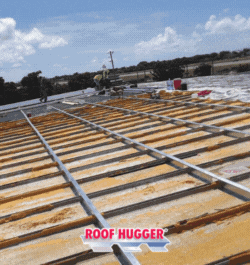



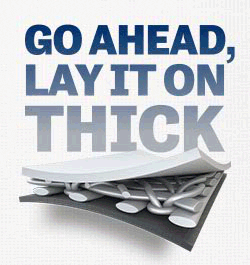







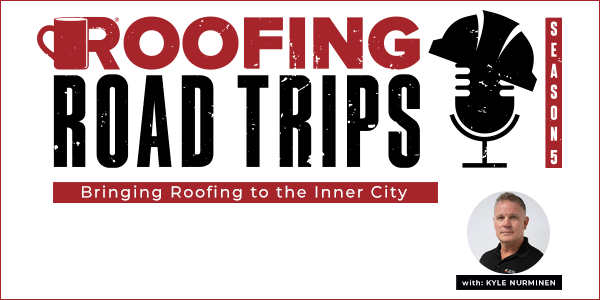
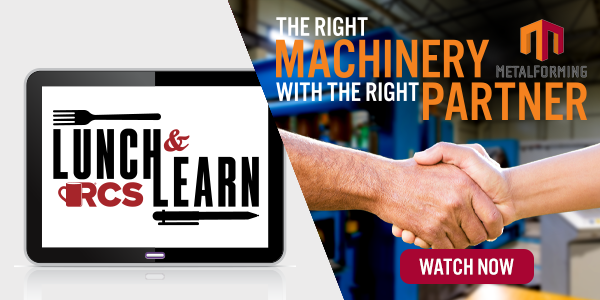
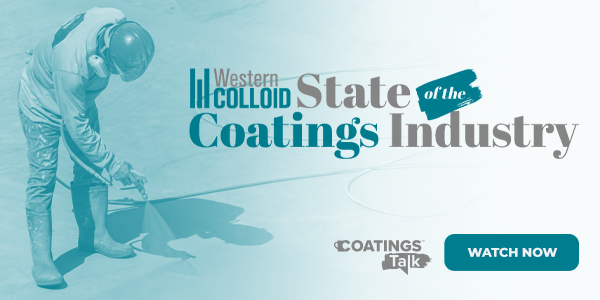
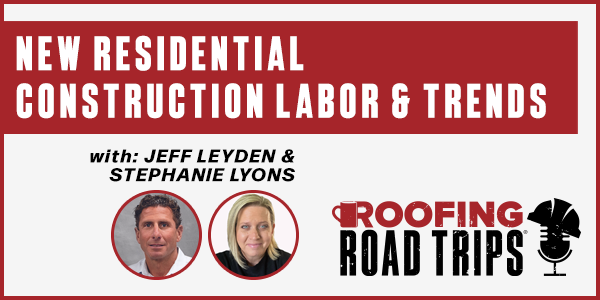




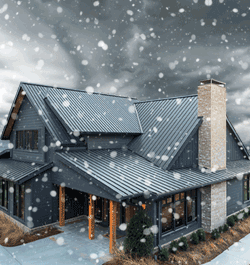

Comments
Leave a Reply
Have an account? Login to leave a comment!
Sign In